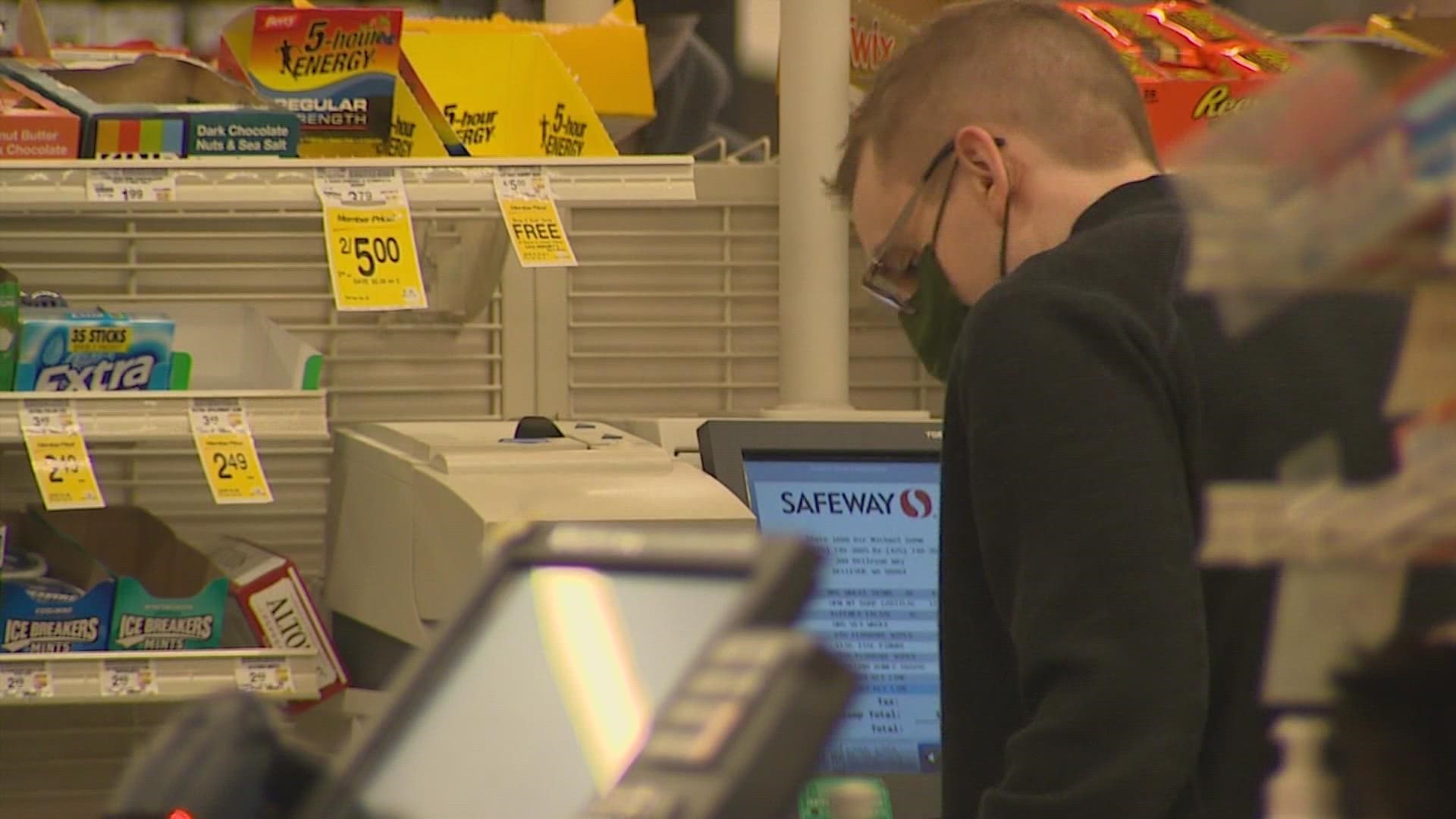SEATTLE — Seattle's grocery businesses may soon no longer have to pay employees an additional $4 an hour in hazard pay after the city council approved ending the requirement on Monday.
The legislation, which needs to be signed by the mayor, is in recognition of the "considerable progress made toward supporting the health and safety of frontline workers and the community through high rates of vaccinations and reduced numbers of COVID-19 cases and hospitalizations," the bill summary reads.
Hazard pay would end 30 days after the legislation is signed by the mayor.
Seattle Mayor Jenny Durkan had not reviewed the bill as of Tuesday, according to Anthony Derrick, Durkan's press secretary. Durkan has until Dec. 23 to make a decision, according to Derrick.
On Feb. 3, the City of Seattle enacted an ordinance requiring grocery businesses to provide employees with pay for work performed during the COVID-19 pandemic. The additional pay was intended to compensate grocery employees for the risks of working on the frontlines and improve their financial stability to stay safe and encourage them to continue working.
The ordinance, unanimously approved by the Seattle City Council and signed into law by Mayor Jenny Durkan, requires stores within city limits with at least 500 employees to pay frontline grocery workers an additional $4 an hour in hazard pay.
It was not intended to extend beyond the pandemic.
The requirement didn't go without opposition.
The Northwest Grocery Association and Washington Good Industry Association sought to block hazard pay. The associations filed a lawsuit, arguing the ordinance was unconstitutional.
U.S. District Court Judge John Coughenour rejected arguments by the Northwest Grocery Association and the Washington Food Industry Association that the pay increase interfered with collective bargaining and discriminated against large grocery stores.
A statement on behalf of Northwest Grocery Association President Amanda Dalton in regards to Monday's vote read:
“The Northwest Grocery Association appreciates the thoughtful deliberation of the Seattle City Council today and their unanimous 8-0 vote to repeal the City’s mandated hazard pay on select grocery stores within its City limits.”
“By January, Seattle grocery stores will have paid over 274 days of hazard pay. As the only business targeted by the Council to pay this enhanced wage, we are appreciative that the Seattle City Council has acknowledged that a repeal makes sense today. Snohomish County, Federal Way and Bainbridge Island have also chosen to repeal their mandate and all municipalities in California, where this concept began, have long since ended. Most California ordinances lasted 120 days. It is our hope that King County will follow the actions of the Seattle Council tomorrow during their scheduled vote.”
“Vaccines have been readily available for Washington grocery store employees since March 2021, and today boosters are just as accessible, more often than not right in the store where they are working. It makes no sense to continue a higher wage mandate on only one industry, and only a subset of that industry. Our grocery stores are grateful for the continued hard work and dedication of their employees, and we will continue to prioritize the safety of our teams and customers and focus on vaccine education and outreach.”
Tom Geiger, the spokesperson for the Seattle branch of United Food and Commercial Workers (UFCW) that represents tens of thousands of workers, released the following statement:
“Hazard pay has been a really important way to start compensating essential grocery store workers for the serious risks they face in order to maintain our community’s access to food, medicine, and supplies during a crisis. UFCW members fought very hard, city by city, to pass hazard pay ordinances, and we’re grateful the Seattle City Council and Mayor listened, acted, and then kept hazard pay in place this long.
"We do need to turn our attention, however, to winning permanent wage increases for essential workers. We now have over 150,000 grocery store workers heading into negotiations across the West Coast. These negotiations will set the industry standard for a workforce that has faced many hazardous conditions on the job—whether it’s a pandemic, snowstorms, earthquakes, wildfire smoke, active shooters, or heat waves. While hazard pay is certainly warranted, workers don’t just need temporary pay raises in just a few places. We need pay increases that are permanent, everywhere, and protected in a union contract.
"Permanent pay increases also boost workers’ pensions and ensure raises cannot be taken away at the whim of an elected leader or employer. It’s a matter of protecting and respecting essential workers over the long term, and that’s what we’re focusing on next.”

